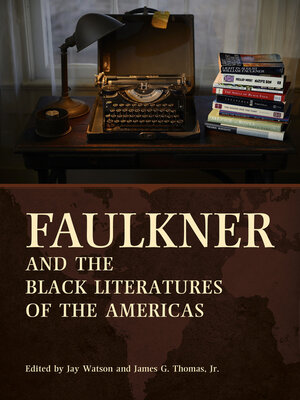Faulkner and the Black Literatures of the Americas
ebook ∣ Faulkner and Yoknapatawpha Series
By Jay Watson

Sign up to save your library
With an OverDrive account, you can save your favorite libraries for at-a-glance information about availability. Find out more about OverDrive accounts.
Find this title in Libby, the library reading app by OverDrive.



Search for a digital library with this title
Title found at these libraries:
| Library Name | Distance |
|---|---|
| Loading... |
Contributions by Ted Atkinson, Thadious M. Davis, Matthew Dischinger, Dotty Dye, Chiyuma Elliott, Doreen Fowler, Joseph Fruscione, T. Austin Graham, Rachel Eliza Griffiths, Derrick Harriell, Lisa Hinrichsen, Randall Horton, George Hutchinson, Andrew B. Leiter, John Wharton Lowe, Jamaal May, Ben Robbins, Tim A. Ryan, Sharon Eve Sarthou, Jenna Sciuto, James Smethurst, and Jay Watson
At the turn of the millennium, the Martinican novelist Édouard Glissant offered the bold prediction that "Faulkner's oeuvre will be made complete when it is revisited and made vital by African Americans," a goal that "will be achieved by a radically 'other' reading." In the spirit of Glissant's prediction, this collection places William Faulkner's literary oeuvre in dialogue with a hemispheric canon of black writing from the United States and the Caribbean. The volume's seventeen essays and poetry selections chart lines of engagement, dialogue, and reciprocal resonance between Faulkner and his black precursors, contemporaries, and successors in the Americas.
Contributors place Faulkner's work in illuminating conversation with writings by Paul Laurence Dunbar, W. E. B. Du Bois, James Weldon Johnson, Jean Toomer, Nella Larsen, Claude McKay, Ralph Ellison, James Baldwin, Ernest J. Gaines, Marie Vieux-Chauvet, Toni Morrison, Edwidge Danticat, Randall Kenan, Edward P. Jones, and Natasha Trethewey, along with the musical artistry of Mississippi bluesman Charley Patton.
In addition, five contemporary African American poets offer their own creative responses to Faulkner's writings, characters, verbal art, and historical example. In these ways, the volume develops a comparative approach to the Faulkner oeuvre that goes beyond the compelling but limiting question of influence—who read whom, whose works draw from whose—to explore the confluences between Faulkner and black writing in the hemisphere.
At the turn of the millennium, the Martinican novelist Édouard Glissant offered the bold prediction that "Faulkner's oeuvre will be made complete when it is revisited and made vital by African Americans," a goal that "will be achieved by a radically 'other' reading." In the spirit of Glissant's prediction, this collection places William Faulkner's literary oeuvre in dialogue with a hemispheric canon of black writing from the United States and the Caribbean. The volume's seventeen essays and poetry selections chart lines of engagement, dialogue, and reciprocal resonance between Faulkner and his black precursors, contemporaries, and successors in the Americas.
Contributors place Faulkner's work in illuminating conversation with writings by Paul Laurence Dunbar, W. E. B. Du Bois, James Weldon Johnson, Jean Toomer, Nella Larsen, Claude McKay, Ralph Ellison, James Baldwin, Ernest J. Gaines, Marie Vieux-Chauvet, Toni Morrison, Edwidge Danticat, Randall Kenan, Edward P. Jones, and Natasha Trethewey, along with the musical artistry of Mississippi bluesman Charley Patton.
In addition, five contemporary African American poets offer their own creative responses to Faulkner's writings, characters, verbal art, and historical example. In these ways, the volume develops a comparative approach to the Faulkner oeuvre that goes beyond the compelling but limiting question of influence—who read whom, whose works draw from whose—to explore the confluences between Faulkner and black writing in the hemisphere.







